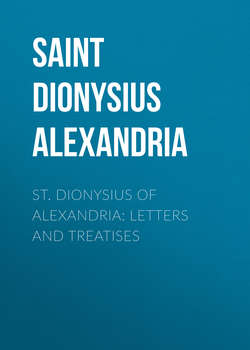Читать книгу St. Dionysius of Alexandria: Letters and Treatises - Saint Dionysius of Alexandria - Страница 17
INTRODUCTION
General Characteristics of his Writings
Оглавление20. The letter to Basilides on several points of ecclesiastical order (the larger portion of which is given on pp. 76 ff.) is a model of what such episcopal utterances should be: it definitely states which is the highest and best course, but leaves the decision to the individual conscience. But it is to the general correspondence (pp. 35 ff.) that the bulk of English readers will probably turn, and that deals with a large variety of subjects: in some cases theological matters like Novatianism and the baptism of heretics are discussed; in others there are descriptions of the martyrdoms of his time at Alexandria and his own personal experiences under persecution, all told with a vividness and a sobriety eminently characteristic of the man: others are addressed to persons or districts in his province, especially at Eastertide, treating of matters of local and temporary importance, while one or two incidents which he records are of much value as illustrating church customs and manners of the period (e. g. the case of Sarapion on p. 42, prayers for the Emperors on p. 47, matters connected with the celebration of Holy Baptism and Holy Communion on p. 59).
In his controversy with the Sabellians, as we have already remarked, some of the expressions and figures employed were insufficiently guarded or explained and so laid Dionysius open to criticism: but we must remember how much more easy it is for us, who have the benefit of subsequent history and experience, to see this and to correct it, than it was for him and for his contemporaries to grope their way, as they slowly but surely did, under the Divine guidance to a fuller knowledge and a more accurate statement of the truth.
21. It is further to be noticed how very seldom, if ever, Dionysius offends against the principles of good taste either when attacking opponents, or when describing horrors, or when dealing with the mysteries of the Faith. In controversy he always displays an admirable moderation and sweetness of tone, which is the more remarkable because his convictions were strong and definite. This is especially to be observed in his treatment of Novatianus the intruder (see p. 50), in his criticism of the deceased Nepos of Arsenoe (see p. 82), and to a less extent in his defence of himself against the charges of Germanus (see p. 43). Even when he has to speak of one whom he believes to have done him wrong, like the Prefect Æmilianus (p. 48), or of one whom his soul abhors like Macrianus (p. 68), his language is mild in comparison with that of many in similar circumstances. So, too, when he takes upon himself to describe the tortures and deaths of the martyrs (pp. 35 f.), or the ravages of pestilence (p. 74), he indulges in but few ghastly or revolting details, though his narrative is always lively and thrilling. And once more when he deals with such a subject as the Eternal Sonship of our Lord, or, if the passage (not here given) be authentic, His Death and Passion, the same good taste and restraint of language is to be observed.
22. Dionysius’s literary style is excellent for the age in which he lived, and so far confirms the truth of the statement that he had been a master of rhetoric before his conversion. He gives evidence of having read widely and to good purpose both in classical and in religious literature. As to the former, he actually quotes from or refers to Homer, Hesiod, Thucydides, Aristotle, and Democritus: but his language is really saturated with classical uses, and a large number of the words and phrases which he employs recall the best writers of antiquity. His compositions exhibit signs of much care in production, notably the treatise On Nature (περὶ Φύσεως) and the two Easter letters, to the Alexandrians and to Hierax (pp. 70 and 73). Here, and to a somewhat less degree in the letter to Hermammon (pp. 65 ff.), he writes in a more rhetorical and elaborate manner than in most of the other fragments which are extant, but even in these passages he is seldom fantastic, or stilted, or obscure; whilst in pure narrative or simple description (e. g. in the letters which record his own or others’ sufferings and in the treatise On the Promises (περὶ Ἐπαγγελιῶν)), his language could hardly be more unaffected or better chosen.
